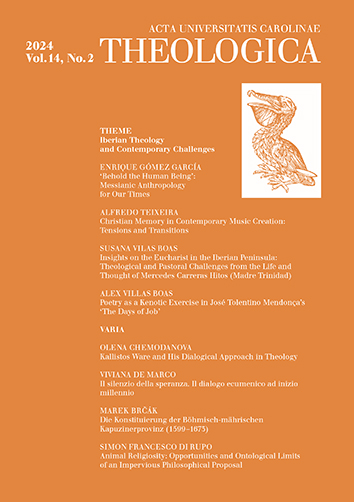AUC Theologica je recenzovaný odborný teologický časopis, který vychází dvakrát ročně. S výjimkou slavistických témat, recenzí a zpráv zveřejňuje příspěvky pouze ve světových jazycích – v angličtině, němčině, francouzštině a italštině.
Časopis se zaměřuje na širokou škálu teologických disciplín, jako je například systematická teologie, biblistika, patristika, pastorální a spirituální teologie, katechetika nebo církevní historie. V rámci nich se snaží reflektovat současná témata, která často vyžadují interdisciplinární přístup. Vítáme také teologické články, které se dotýkají jiných akademických oborů, jako je například filosofie, sociologie, literární věda či vědy přírodní.
Každé číslo se skládá ze dvou sekcí. Tematická sekce obsahuje články s jednotným zaměřením. V sekci s názvem „Varia“ publikujeme původní studie na různá aktuální teologická témata. Všechna čísla časopisu jsou dostupná v režimu Open Access.
AUC THEOLOGICA, Vol 9 No 1 (2019), 9–29
The ‘Return of Religion’ in Martin Heidegger’s Work: Overview and Criticism
[The ‘Return of Religion’ in Martin Heidegger’s Work: Overview and Criticism]
Balázs M. Mezei
DOI: https://doi.org/10.14712/23363398.2019.3
zveřejněno: 13. 11. 2019
Abstract
Martin Heidegger’s thought is often seen in the context of its opposition to the traditional notion of religion as expressed especially in Christianity. Since Heidegger became not only estranged from, but even inimical to Christianity at least from his mid-period, some interpretations label his thought atheistic. However, as was pointed out among others by John Caputo or Friedrich-Wilhelm von Herrmann, the relationship between religion and Heidegger’s thought is complex. As a young person preparing for Catholic priesthood, Heidegger had a deep understanding of religion on the spiritual as well as the theological level. This essay attempts to show the general background of Heidegger’s attitude concerning religion in the tradition of the medieval writing entitled German Theology and also in the age when Heidegger developed his insights. It argues that, especially from his mid-period, Heidegger developed a peculiar kind of mysticism, which can be conceived in the context of the critical tradition of previous forms of religious mysticism. This tradition is even more critical if we leave the realm of German ‘titanism’ and seek for alternative philosophical expressions not arising from that linguistic context. The essay concludes that it is possible to understand Heidegger’s proposals as instrumental to a new understanding of the continuously changing forms and contents of religion if and only if one is prepared to apply the necessary amount of critical reflection.
klíčová slova: Martin Heidegger; Black Notebooks; Philosophy of religion; ‘Vallásbölcselet’; Philosophy of revelation

The ‘Return of Religion’ in Martin Heidegger’s Work: Overview and Criticism is licensed under a Creative Commons Attribution 4.0 International License.
148 x 210 mm
vychází: 2 x ročně
cena tištěného čísla: 100 Kč
ISSN: 1804-5588
E-ISSN: 2336-3398
